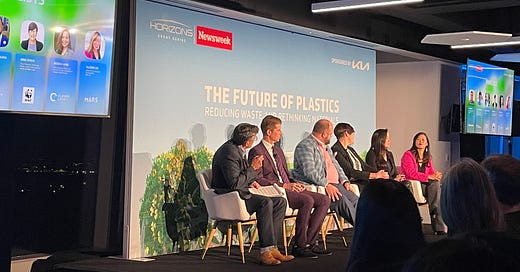Health Insights, Missing Voices, and the Cautious Road to a Strong Plastics Treaty
And infographic of the week (IOTW)
I attended a Newsweek moderated, Kia-sponsored panel on plastics recently and here are my takeaways. Titled “The Future of Plastics: Reducing Waste and Rethinking Materials” the panelists featured Jessica Long, chief strategy officer and head of Closed Loop Partners' operating group Closed Loop Builders; Erin Simon, the VP and head of plastic waste and business at the World Wildlife Fund; U.S. Plastics Pact CEO Jonathan Quinn; Mars Global Vice President of Packaging Sustainability Allison Lin; and Dr. Leonardo Trasande from the NYU Center for the Investigation of Environmental Hazards.
The Newsweek panel provided a valuable opportunity to reinforce key concepts around plastic recycling and sustainability, including the importance of reduction, the role of Extended Producer Responsibility (EPR), and the need for stronger infrastructure. However, while such panels are effective in raising awareness and reiterating challenges, they often lack the depth and specificity needed to delve into actionable solutions. The absence of Kia’s voice, despite its sponsorship, left a gap in understanding their initiatives to tackle plastic waste in vehicles. Overall, the panel emphasized urgency but underscored the need for forums that go beyond surface-level discussions to drive tangible progress.
Where was Kia? For an event sponsored by Kia, they were nowhere to be seen or heard from. Considering the company’s commitment to using recycled plastic content, it would have been good to hear Kia’s take on the implications of such a strategy on their business. For example, in the Kia EV9, the automaker uses around 34 kilograms of recycled materials per vehicle, which includes recycled plastic derived from ocean waste such as fishing nets. In the Kia EV6, another electric model, up to 111 plastic water bottles are recycled to create fabrics and mats. We need panels that can bring more actors to the discussion and review impacts of treaties and commitments as well as how discuss ongoing implications on business strategies.
Cautious-yet-optimistic consensus on a stronger plastics treaty that needs science-backed action: In a world attuned to big announcements and flashy consensus-based press announcements, the Busan INC-5 event was a disappointment. The panelists at this event believed that waiting for a stronger plastics treaty was better than a watered down-one. It almost seemed like the industry had expected this even though the media and those not as plugged into the industry had hoped for flashier announcements. The INC process has shown a growing coalition of nations committed to tackling plastics pollution. This “progressive majority” must continue to assert itself ahead of INC-5. The Montreal Protocol serves as a powerful example of science-driven policy success. It tackled ozone depletion by implementing caps on harmful chemicals and mandating phase-outs. For the plastics treaty, panelists emphasized the need for the best available science and robust lists of chemicals of concern to inform action.
Limiting production requires businesses to rewire operations: Alternate materials are available to businesses; investing in these and simplifying product design are crucial pieces of the plastics reduction puzzle. Procurement policies need to be better aligned with these goals to ensuring businesses and governments prioritize sustainable materials.
Impacts on human health was a welcome cameo: It is not too common to see panelists that focus on health impacts of waste. Dr. Trasande discussed some of these. Since the panel was so heavily focused on what’s next after Busan, this seemed to be more of a check-the-box exercise rather than diving into specifics. The need for a mandatory phase-out of harmful plastics, especially those that are non-recyclable or contain toxic chemicals like PFAS, was highlighted. These materials contribute significantly to pollution and health risks, and chemicals in plastics are shown to have a $1.2 trillion health cost.
Words to describe the current plastics recycling systems in the United States: In the panel discussion, the state of plastic recycling in the U.S. was described using several distinct terms, reflecting different perspectives on its challenges and opportunities:
Unhealthy: Highlighted the risks posed by toxic chemicals in certain plastics, such as flame retardants in black plastics, which leach into the environment and harm human health.
Broken: Emphasized systemic issues, including a lack of infrastructure, transparency, and economic incentives, leading to inefficiencies and reliance on landfills.
Inefficient: Focused on the gaps in sorting and collection technologies and the need for energy-efficient solutions like better recycling infrastructure.
Maturing: Acknowledged the incremental progress being made through technological innovation and policy shifts like Extended Producer Responsibility (EPR).
Promising: Recognized the growing demand for recycled materials and the potential for a circular economy if robust infrastructure and policies are implemented.
These terms collectively underscore the complexity of challenges and opportunities in U.S. plastic recycling, reflecting the need for comprehensive action.
Infographic of the week: The Global Plastics Waste Trade
Source: Visual Capitalist
Every year, nations worldwide produce around 350 million metric tons of plastic waste. This is equivalent to over 10 million fully loaded garbage trucks.
Most of this plastic waste is either incinerated or sent to landfills, thus eventually polluting our air, land, and oceans. Only a fraction of this waste is recycled, and contrary to popular belief, just 2% is traded internationally.
How do you feel about this topic?




